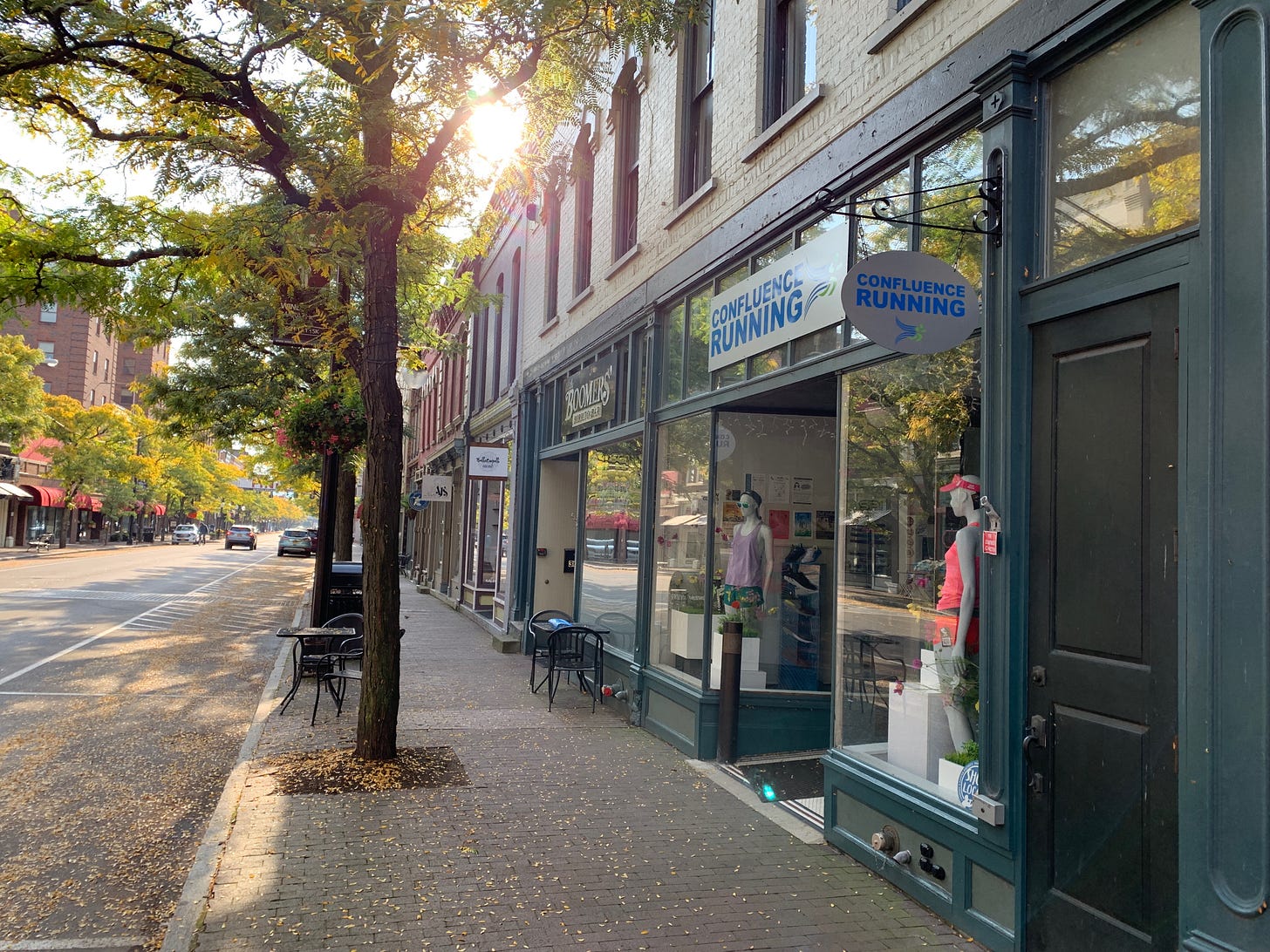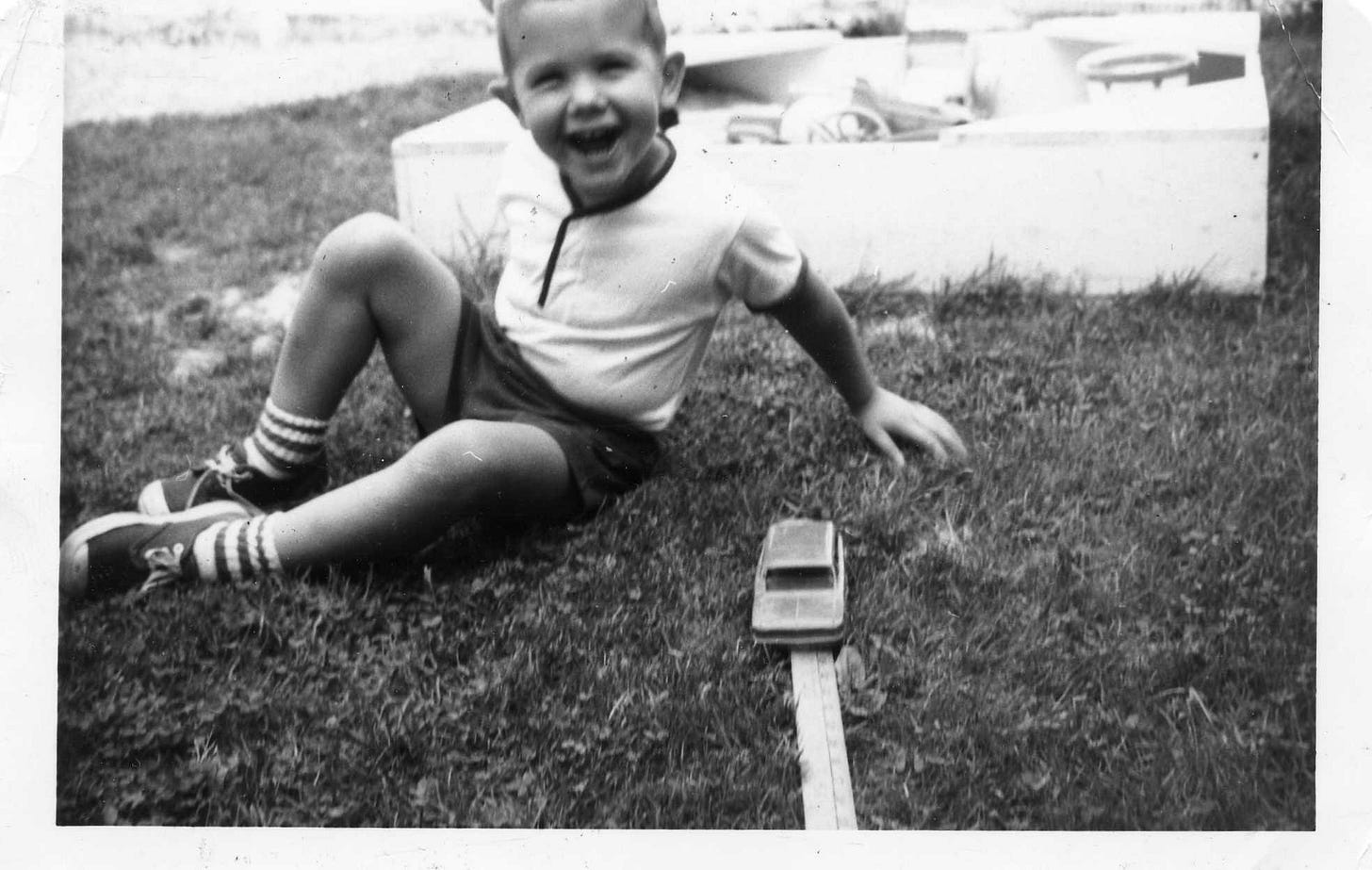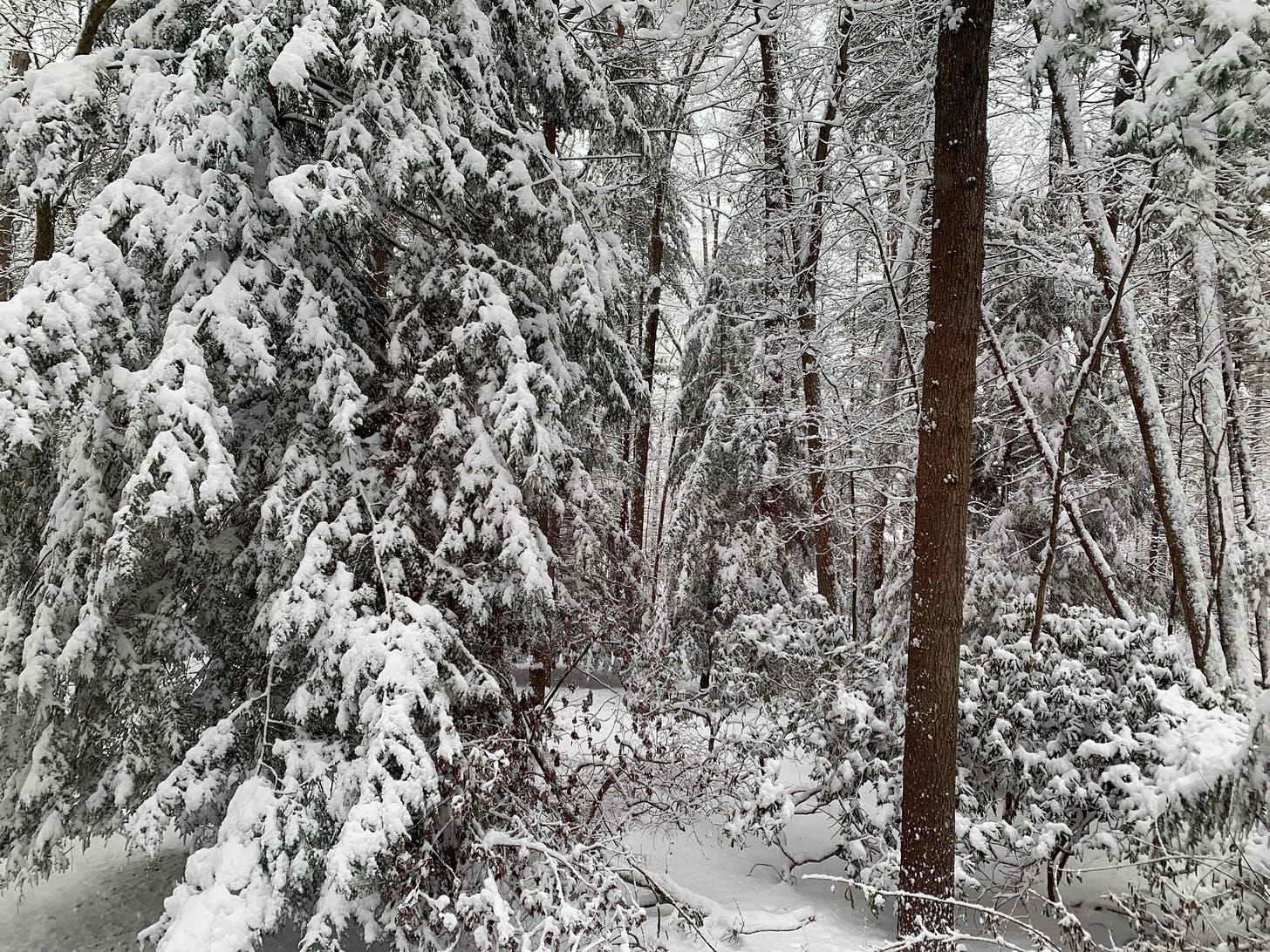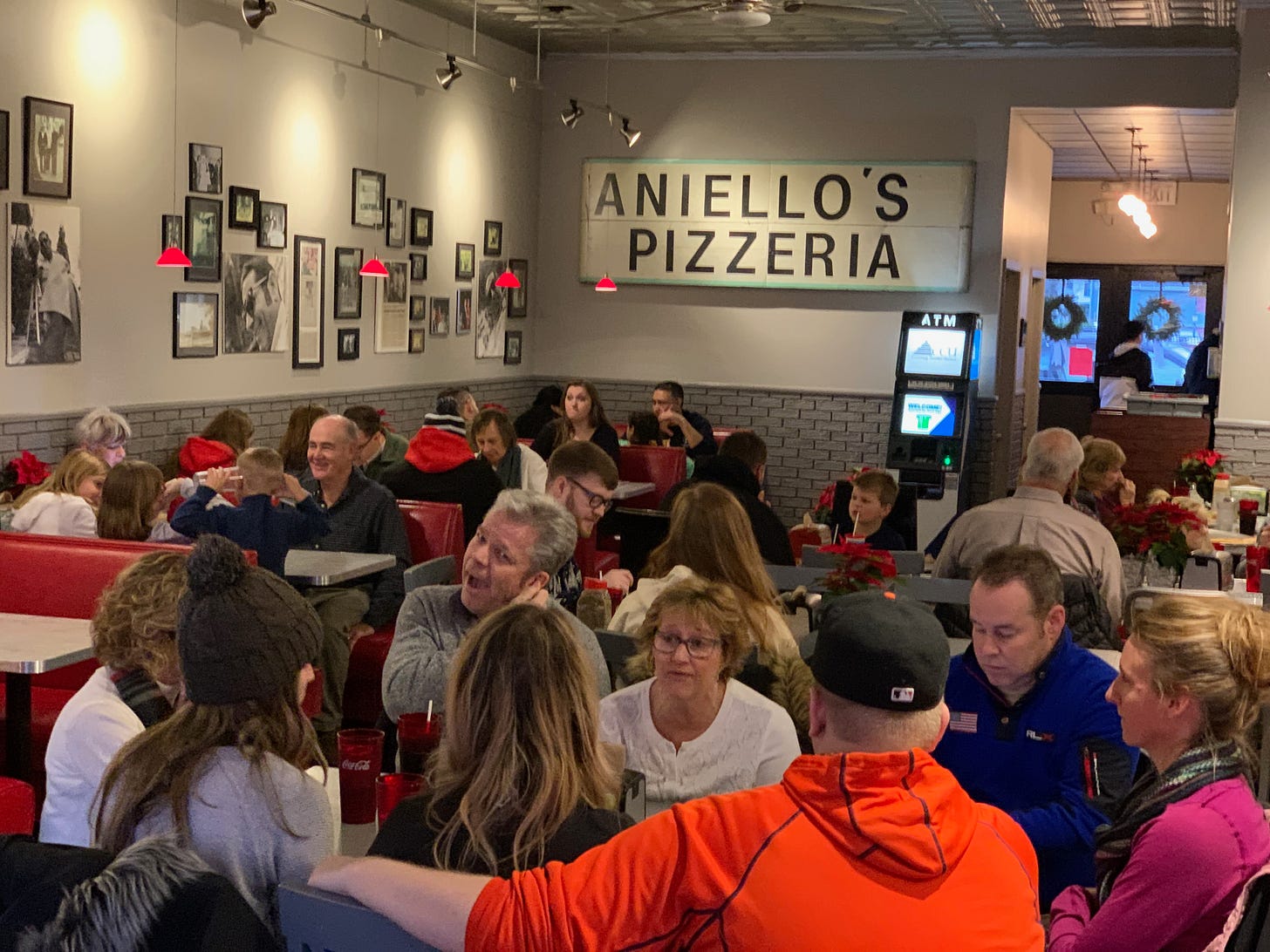I had a unique, magical childhood because it was so utterly normal and All-American. That feels more and more unusual these days, almost exotic, and it’s this week’s Specific.
Do you have a home? Is there a place that’s so familiar, so much a part of who you are that it’s part of your DNA? I’m always struck, and a little saddened, by how many people don’t. They grew up in some faceless city or suburb, or moved so many times that they didn’t really grow up anywhere. For them, the whole idea of belonging somewhere in that Wizard of Oz, there’s-no-place-like-home way, is a blank. Not for me, though. I’m from somewhere.
Since I started this project about six months ago, I’ve been surprised at how often I find myself writing about my childhood. I didn’t expect this. It never occurred to me that it would be so important. But it is, and my awareness of this is at least partially thanks to reading Rob Henderson’s book Troubled.
The book isn’t great, but it’s important. It’s the story of Henderson’s upbringing in the California foster care system, leading, miraculously, to his eventual graduation from Yale. The book’s big flaw is that it goes on for many chapters about Henderson bouncing from home to home, and getting in a fairly banal, ongoing series of scrapes. Drinking, fighting, bad grades, recklessness, blah, blah, blah. Henderson’s meticulous description, at length, of his early life gets tedious.
However, all this inevitably led me to contrast his childhood with mine. I did not grow up in the foster care system. I had two solidly married parents. There were no drugs, no drinking, no abuse, nothing wrong. I lived in a rural area near a small town, and I stayed in the same place until I departed for college. It was straight out of the Andy Griffith Show, as All-American as you could get, very sheltered, very innocent. Doing a little primitive math, this beginning put me in a pretty small group, about 5% of the population. And forty years down the road, it seems like especially on social media, that kind of upbringing is unusual, to the point that I’m going to try to describe it.
First of all, growing up in a place like that means that everybody knows everybody else. A lot of people I’ve known moved so often that they never put down roots. I put down very, very deep roots. This in itself is unusual these days, I think, but in those days, community was real, and simply by existing, you were part of it. I can still name all the families on my street growing up. I knew all of them, had been in their houses, saw them all the time. Some of them were surrogate parents. I am still friends with people I have known since nursery school.
This matrix extended outward, forwards and backwards. My friends’ parents knew my parents. My teachers had taught my brothers and sisters before and after me. “Are you Chuck’s brother?” They also knew my parents. In a small town, you cannot get away with being an asshole, because sooner or later, you’re going to have to deal with the person you were an asshole to. You don’t have to like them, but you have to figure out a way to get along with them. These days, that seems like a rare ability.
This tight, ongoing network had a lot of additional implications, beginning with the fact that kids were always being supervised by someone who knew them. As a result, you couldn’t get away with much.
For example, at one point, at the age of about ten, I was very into making prank phone calls with some of my little pals. We would dial a number at random, then say something like the following: “Hello. We’re doing a survey, and would like to get your opinion about an important topic.” The victim would ask what the topic was. That was our cue to say, “Fucking!” and then hang up, laughing helplessly.
Until, one day, someone recognized my voice. Then called back. Then called my mother. The ensuing ass-kicking permanently ended my prank phone call career. Small towns are like that – someone always knows you. Similarly, one summer we busted out the lawnmowers and created a splendid baseball diamond in what was, we thought, a vacant field. It took a LOT of work, which turned out to be a waste when the Mormons, whose field it was, decided to build a church there. Our neighbors, the Carlisles, were members.
Forty years after I’d moved out to go to college, my mother, in her last year, was assisted by caregivers. These were tough, smart, endlessly patient and kind women, and when I visited home, it was like I had never left. For example, one of the local watering holes, which I used to patronize, was a joint called Junior’s Log Cabin. When I drank there, it was literally a log cabin – it’s been smartened up since somewhat. Across the road was a tractor dealership, where State Police patrols would sometimes lurk to nail people leaving Junior’s and then driving. One of my mom’s nurses’ family owned the dealership, and she was complaining to my mom that there was nothing they could do to keep the cops from doing that. My mom knew everyone involved, including the cops. And so on. Someone is always related to someone else, or knows them, or is cousins with them. That’s how small towns work.
The tightness of the community did not, however, extend to supervising play. The whole notion of helicopter parenting would have seemed insane. There was a firm line between what kids did and what adults did, and much of the time, the kids were really left to their own devices. Our parents were busy, and did not care where we went or what we did, as long as we made it back for dinner. I saw a meme once about how my generation grew up on hose water and neglect. Yes, we did. Everyone had bikes, which meant that you got home from school, changed into your play clothes, and took off to:
Play football, or hockey, or basketball or baseball, depending on the season. There were zero adults involved, ever.
Build treehouses, some of which were very rickety and high. It’s a miracle nobody got killed.
Play in the creek – build dams, primarily.
Fish in the river, or a pond
Climb trees
Go sledding in the winter
Go skating in the winter on one of the local ponds, or in the swamp, sometimes building fires on the ice to keep warm.
Go to one of the trampolines in the neighborhood and jump. I could never figure out how to do a backflip
Go into the woods, which sometimes meant starting fires, setting off firecrackers, or whatever.
Unless you really hurt yourself, there was also zero parental interest in danger or injuries. I always had bruises somewhere, or scabs, usually on my knees. I was constantly breaking my glasses. People fell off bikes or skateboards, fell out of trees, became hypothermia-adjacent from playing in the snow for hours, cut themselves, whatever. I can recall, several times, falling through the ice while skating alone and having to walk a mile or so home with my skates still on.
Nobody even thought about protection from the sun, and by the end of the summer, everyone had deep tans. I still have a scar on my face from going headfirst through a storm window. I remember when Annette Hagy broke her leg sledding on Swan Hill, or when Belinda Hannon fractured her skull on a trampoline. These days, this would mean someone was going to get sued into oblivion. Not then. At dinnertime, my mother would step out onto the back porch, and blow a black whistle that hung on a cup hook next to the door. You could hear that for a mile or so, and it meant it was time to come home.
Writers, journalists and other idiots routinely depict small towns as hotbeds of racism, hatred, homophobia and narrow-mindedness. These people have watched way too much television. In fact, small towns are the exact opposite. People don’t care, at all, who you are or what you do. If you live there, you’re on the team, and that is that. For example, there was one leading pizza place, and everyone went there after football games. It, too, has been smartened up, but if you ask anyone from home who has the best pizza, it’s Aniellio’s.
Relative to my classmates and friends, my family had a lot of money. My father was a board-certified surgeon, and my mother was a lawyer, although she didn’t practice. His success made no real difference. I had friends whose families had no money, who lived in shacks or trailers, who were truck drivers, carpenters, dairy farmers, or nothing, really. One of my classmates was named “Boog” – I didn’t realize he had another name until I was about thirty. The local gas station was run by a fellow named “Toad” – I never learned his actual name. I knew where he lived, I knew most of his family, and I would ride my bike down there all the time. And it was totally normal for my mother, who was every inch a lady and said once that she wouldn’t go out to the mailbox without putting on lipstick, refer to him as “Toad”. “Where were you, Mom?” “Oh, I had to go down to Toad’s.” Our next door neighbor had a boyfriend named Tim who wasn’t renowned for his intellect, so he was known, of course, as Dim Tim. By everyone.
Everyone had dogs, it seemed. Bill Plummer’s family had a weird little poodle named Napoleon. The Hagys had Beau, a Golden Retriever. Mr. Heib, the junior high school principal who lived two doors away, had an immense St. Bernard named Tucker. The Heibs had three boys, they were all skiers, and I learned decades later that their dog was named after a company that made equipment for ski hills. None of these dogs were ever walked, or picked up after. They just went outside, and came back when they felt like it.
Our family had two Brittany Spaniels that did have to be let out one at a time. If they both were out, they’d pair up, and go on a canine equivalent of a Hell’s Angels run. They’d disappear into the woods (which were across the road) and come back in two or three days, having spent the time chasing deer, rolling in shit and disgracing themselves. I’d come back from school and find them in the garage, passed out, sometimes with a deer leg or something worse lying next to them. They were the OGs of dogs.
Hunting was a big deal. Our county has had the biggest deer harvest in New York State for decades. When I was in high school, the parking lot would be full of unlocked pickup trucks with loaded rifles in racks behind the driver’s seat. In the fall, you would hear gunfire in the hills for weeks, and people would talk about the deer they’d taken, would take, didn’t get. Being called a redneck was a compliment.
The innocence from growing up in the sheltered place runs deep. One of my friends’ mothers was a no-kidding, hardcore alcoholic. A couple of times a week we’d come home from school to find her in her bathrobe, slumped over a bottle of gin at the kitchen table. I didn’t realize what was going on until I was about thirty. I didn’t see my first homeless person until college, and I remember carefully explaining to him why I couldn’t give him any money.
There was essentially no crime, and almost no drugs, although I managed to get my hands on the extremely low-quality marijuana available in western New York state beginning at about sixteen. In those days, getting caught with weed meant serious, no-kidding jail. If someone had told me then that I’d one day live in a place where weapons-grade pot was both legal and widely available, I would have said they were crazy. DUI was also not a big deal in that time and place. I can remember driving back from skiing with a six-pack of beer on the passenger seat, polishing off three or so along the way.
This sheltered upbringing made eventually encountering the wider world intoxicating. For example, skiing. There are ski hills in Western New York. I learned to ski at a place called the Pinnacle, in Addison New York, which had one poma lift, one T-bar and a vertical drop of – ready for it? 723 feet. At the time, it seemed like the biggest, most glamorous, most challenging place in the world. It was quite a surprise when I eventually made it out to the West, and encountered, oh, Snowbird, which has 3,240 feet of drop. The same dynamic took place with all kinds of things – concerts, restaurants, cities. Growing up in a small town, you don’t have any idea of how big and sophisticated things can get. When you encounter them, it’s kind of mind-blowing.
And why does all this matter? After all, it’s decades later. Many of the people I grew up with – the adults, at least – are dead. Everyone has been subject to the usual litany of human problems – divorces, sickness, loss, all kinds of obstacles. Unless you happen to be from western New York state, all of this seems like something from a novel. The honest answer is, I’m not sure. I can’t assemble an argument.
But still, for some reason I can’t really put my finger on, I think it’s important for a person to be able to say, in one sentence, without having to explain more, where they’re from. It’s important to know what it means to be part of a community. It’s important to burrow deeply into a place, to leave your mark on it, to know the customs and history and people of a place even if you can’t explain why.
Or, at least, it’s important to me.









I, too, grew up in the same small town. And until my Mom passed away this summer (at 99 with 9 kids) I always referred to it as going home. And my kids knew that meant Corning. My husband grew up there too. They love Aniello's. I really enjoyed your article. We really did live an almost magical existence. Toad was the best! And I recognized few other names too. Thanks for sharing. Ann Reilly Connor
Love it Peter. I came 'home' for good in 2009, drawn back by the feelings you illuminate - never forgotten, never replaced. Your essay inspires my own reflection of free play, and while we never needed to put our finger on it, we felt free. That is a foundation that can shape a lifetime. And let's update the DUI reference to DWI. How those good folks made it home safe from Saturday night at the Elks Club, well, just further evidence that Corning is, and has always been (at least in my life) a magical place.